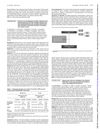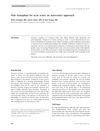 2 citations,
February 2019 in “Journal of dermatological treatment”
2 citations,
February 2019 in “Journal of dermatological treatment” A new surgical technique effectively cures acne in most patients.
 February 2024 in “International journal of health, medicine and nursing practice”
February 2024 in “International journal of health, medicine and nursing practice” Raising awareness about PCOS can improve women's quality of life.
 June 2023 in “Research Square (Research Square)”
June 2023 in “Research Square (Research Square)” Different immune responses cause hair loss in scalp diseases, with unique patterns in scalp psoriasis possibly protecting against hair loss.
 June 2020 in “Annals of the Rheumatic Diseases”
June 2020 in “Annals of the Rheumatic Diseases” Patients need better information about the risks of long-term steroid use.
 February 2019 in “International journal of research in dermatology”
February 2019 in “International journal of research in dermatology” The combined treatments were highly effective for improving atrophic acne scars.
 September 2018 in “Fertility and Sterility”
September 2018 in “Fertility and Sterility” African American women have a higher risk of preterm delivery than Caucasian women, and inflammatory stimuli affect gene expression in cells related to PCOS, showing a heightened inflammatory state in women with PCOS.
 January 2012 in “Yearbook of Dermatology and Dermatologic Surgery”
January 2012 in “Yearbook of Dermatology and Dermatologic Surgery” Taking finasteride daily can effectively and safely increase hair density and thickness for women with hair loss.
 January 2012 in “Yearbook of Dermatology and Dermatologic Surgery”
January 2012 in “Yearbook of Dermatology and Dermatologic Surgery” Low-dose isotretinoin is as effective as conventional doses for acne and has fewer side effects.
 April 2021 in “Journal of Investigative Dermatology”
April 2021 in “Journal of Investigative Dermatology” Transgender patients on hormone therapy experience more acne and hair loss, but less skin inflammation.
 April 2018 in “Journal of Investigative Dermatology”
April 2018 in “Journal of Investigative Dermatology”  119 citations,
January 2012 in “Nutrition & Metabolism”
119 citations,
January 2012 in “Nutrition & Metabolism” Modern lifestyles, including poor diet, stress, and long-term use of certain medications, hinder the body's ability to heal from inflammation, leading to chronic diseases.
 105 citations,
January 2009 in “Medicine”
105 citations,
January 2009 in “Medicine” Hirsutism is more linked to high androgen levels than acne or hair loss, and a mix of hormonal tests is best for diagnosis; certain treatments can reduce symptoms.
 99 citations,
December 2010 in “Journal of The European Academy of Dermatology and Venereology”
99 citations,
December 2010 in “Journal of The European Academy of Dermatology and Venereology” The document concludes that certain genetic mutations and dietary factors are involved in acne development, and treatments like isotretinoin and diet changes can help manage it.
 75 citations,
May 1986 in “Clinics in endocrinology and metabolism”
75 citations,
May 1986 in “Clinics in endocrinology and metabolism” Male hormones are important for hair and oil gland development and can cause conditions like excessive hair growth and acne.
 59 citations,
December 2016 in “Clinical, Cosmetic and Investigational Dermatology”
59 citations,
December 2016 in “Clinical, Cosmetic and Investigational Dermatology” Acne keloidalis nuchae is a tough-to-treat condition that greatly affects quality of life, especially in men of African descent.
 47 citations,
January 2015 in “Dermatology”
47 citations,
January 2015 in “Dermatology” The best way to treat acne is to prevent healthy skin glands from turning into acne lesions by controlling the triggers early on.
 43 citations,
May 1986 in “Clinics in Endocrinology and Metabolism”
43 citations,
May 1986 in “Clinics in Endocrinology and Metabolism” Cyproterone acetate is effective for treating hirsutism and acne but less so for hair loss, with side effects similar to birth control pills.
 41 citations,
June 2010 in “Anais Brasileiros de Dermatologia”
41 citations,
June 2010 in “Anais Brasileiros de Dermatologia” Isotretinoin is safe and effective for acne, with common side effects like dry lips; serious side effects are rare.
 31 citations,
June 2015 in “British Journal of Dermatology”
31 citations,
June 2015 in “British Journal of Dermatology” Hormonal treatments are effective as a second-line option for moderate-to-severe acne in females, but should be used with caution due to health risks.
 18 citations,
August 2011 in “Clinical Drug Investigation”
18 citations,
August 2011 in “Clinical Drug Investigation” Low-dose isotretinoin combined with pulsed azithromycin cleared acne in most patients, with mild side effects.
 9 citations,
April 1976 in “Archives of Dermatology”
9 citations,
April 1976 in “Archives of Dermatology” Iodides can cause skin issues like acne and other health problems.
 8 citations,
June 2016 in “Journal of Cosmetic Dermatology”
8 citations,
June 2016 in “Journal of Cosmetic Dermatology” Women with persistent acne and high levels of antimullerian hormone are more likely to have polycystic ovarian syndrome.
 8 citations,
December 2015 in “Daehan han'yi hag'hoeji/Journal of Korean medicine”
8 citations,
December 2015 in “Daehan han'yi hag'hoeji/Journal of Korean medicine” Transtherapy significantly improved moderate to severe acne scars without side effects.
 3 citations,
August 2019 in “Journal of The American Academy of Dermatology”
3 citations,
August 2019 in “Journal of The American Academy of Dermatology” Higher doses of spironolactone may improve acne in PCOS patients, but side effects are a concern.
 2 citations,
June 2012 in “Journal of Cosmetic Dermatology”
2 citations,
June 2012 in “Journal of Cosmetic Dermatology” Hair transplant using beard hair made acne scars on cheeks less visible with minimal scarring in the donor area.
 1 citations,
March 2022 in “Cureus”
1 citations,
March 2022 in “Cureus” A woman with lupus and systemic sclerosis developed severe acne that didn't improve with treatment and died from pneumonia and septic shock.

The method creates realistic, anonymous acne face images for research, achieving 97.6% accuracy in classification.
 September 2023 in “International journal of biomedicine”
September 2023 in “International journal of biomedicine” Minoxidil might help treat acne scars by reducing collagen buildup.
 April 2020 in “Journal of the Endocrine Society”
April 2020 in “Journal of the Endocrine Society” Non-classic congenital adrenal hyperplasia (NCCAH) can mimic PCOS and requires genetic testing for proper diagnosis and treatment.
 September 2019 in “Journal of Investigative Dermatology”
September 2019 in “Journal of Investigative Dermatology” The 3D-SeboSkin model effectively simulates Hidradenitis suppurativa and is useful for future research.






























